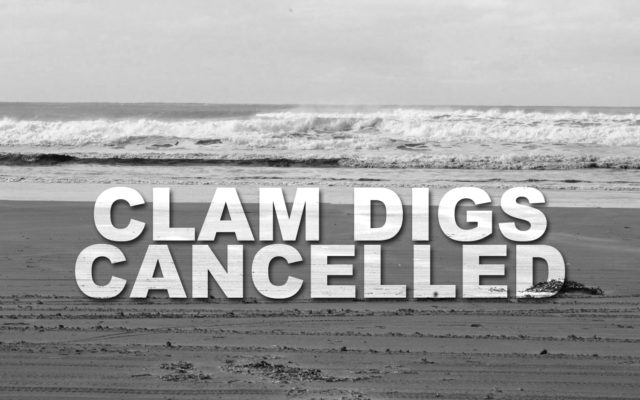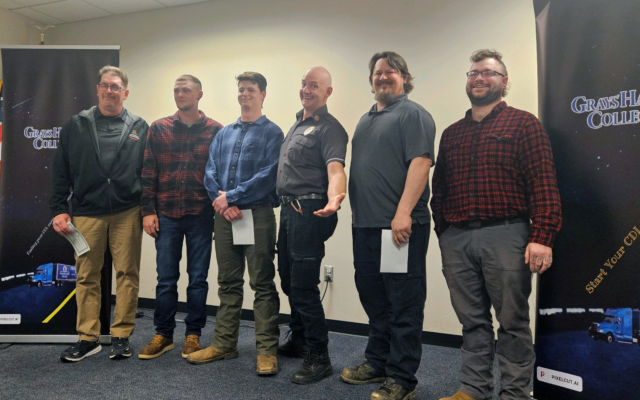Razor clam digs canceled until further notice

The tentatively announced November 13-19, 2020 recreational razor clam opener is cancelled.
The Washington Department of Fish & Wildlife tells KXRO that all future planned dates will remain on hold until further notice.
Coastal Shellfish Manager Dan Ayres says that marine toxin tests continue to show elevated levels on all beaches other than Mocrocks, and that has interrupted the planned digging.
In an clarification, Ayres said “To be clear, all of these domoic acid levels are over the 20 ppm action level except Mocrocks. Because cell counts (from 11/3) of the diatom species that is producing domoic acid are so high in surf zone water samples taken from Mocrocks, we fully expect the domoic acid levels on this beach to also to soon be over the action level.”
MARINE TOXIN UPDATE:
Listed below are the most recent marine toxin levels, as announced by the Washington Department of Health (WDOH).
“As you can see, these samples are all below the action level for Amnesic Shellfish Poisoning (ASP) from Domoic Acid, Paralytic Shellfish Poison (PSP) and Diarrhetic Shellfish Poison (DSP).”
Ayres says that before a beach can be opened for the harvest of razor clams, WDOH protocol requires that all razor clam samples collected from that beach must test under the action level (20 ppm for domoic acid; 80 µg/100g for PSP; and 16 µg/100g for DSP) on both of the two required sample collections.
In all of these samples; only razor clam meat tissue is tested.
The following samples were all collected on 11/1/2020.
Long Beach Area E (north):
- domoic acid = 57 ppm
- PSP = none detected
- DSP = none detected
Long Beach Area OY (middle/north):
- domoic acid = 60 ppm
- PSP = none detected
- DSP = none detected
Long Beach XA (middle/south):
- domoic acid = 60 ppm
- PSP = none detected
- DSP = none detected
Long Beach A (south):
- domoic acid = 59 ppm
- PSP = none detected
- DSP = none detected
Twin Harbors Area XH (north):
- domoic acid = 60 ppm
- PSP = none detected
- DSP = none detected
Twin Harbors Area CL (middle):
- domoic acid = 83 ppm
- PSP = none detected
- DSP = none detected
Copalis Area XL (middle)
- domoic acid = 23 ppm
- PSP = none detected
- DSP = none detected
Mocrocks Area BC (middle)
- domoic acid = 11 ppm
- PSP = none detected
- DSP = none detected
These results and the historical record of domoic acid events can be found at: https://wdfw.wa.gov/fishing/basics/domoic-acid/levels (click on “show historical data” and then hover your curser over the data points for more detail).
WDFW managers will await additional test results from DOH prior to announcing additional digging opportunities.
WDFW has seen near record participation on recent digs. To avoid concentrating clam diggers and disproportionately increasing the risk of COVID-19, all razor clam beaches are closed for harvest statewide—including on Mocrocks Beach, where domoic acid levels have risen to at least 11 ppm and may have risen to unsafe levels since the latest test by DOH.
Razor clam diggers have enjoyed more than 80,000 trips and harvested nearly 1.2 million clams in 2020, but the department won’t be able to announce if tentatively scheduled December digs can move forward until marine toxin test results are conducted by DOH in mid-November.
Public health officials will also be closely monitoring the incidence of COVID-19 throughout the digging season, and WDFW will rely on their guidance when making in-season adjustments to the schedule if necessary to reduce public health risks.
The next round of razor clam samples will be collected in mid-November.
WDFW and their colleagues in the ORHAB (Olympic Region Harmful Algal Bloom) partnership will continue on-going counts of harmful algae cells and the levels of domoic acid produced and present in surf zone water samples.
For more information on razor clams, including how seasons are set, population sampling techniques and how to dig, clean and cook razor clams please see the following link:
https://wdfw.wa.gov/fishing/shellfishing-regulations/razor-clams
For more information on marine toxins and other harmful algal blooms, see the following links:
- http://www.doh.wa.gov/CommunityandEnvironment/Shellfish/BiotoxinsIllnessPrevention/Biotoxins/AmnesicShellfishPoisoning.aspx
- http://www.doh.wa.gov/CommunityandEnvironment/Shellfish/BiotoxinsIllnessPrevention/Biotoxins/ParalyticShellfishPoison.aspx
- https://coastalscience.noaa.gov/research/stressor-impacts-mitigation/



